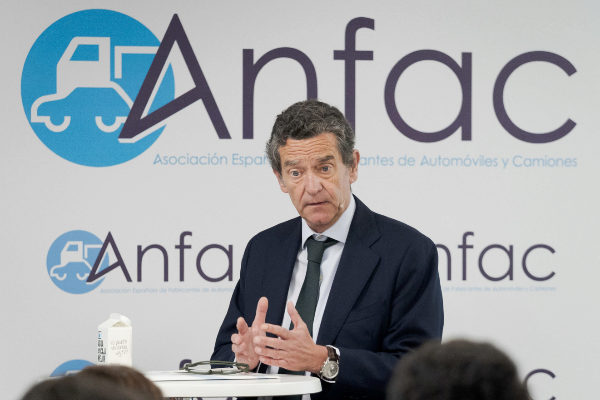- Interview: Mario Armero: "The car 'made in Spain' competes well in the world"
Mario Armero, executive vice president of the Spanish Association of Automobile and Truck Manufacturers (Anfac), will leave his post on December 31 of this year, as EL MUNDO has been able to confirm from various sources. Armero (Madrid, 1958) entered Anfac at the end of 2011, replacing Luis Valero, general director, with a position that was created for him because until then he did not exist. The exit, negotiated during the last months, has been produced by mutual agreement.
Your substitute should be known in the coming weeks. Among the candidates the names of Miguel Sebastián, Minister of Industry with the PSOE between 2008 and 2011, and Begoña Cristeto have been considered. The latter was in charge of the General Secretariat of Industry and Small and Medium Enterprises with the PP from 2014 to 2018. Both, from their respective positions, were direct interlocutors with the Spanish automotive sector.
Throughout those eight years, Armero has worked with six presidents in Anfac. The first, Francisco García Sanz (VW), who was the one who hired him. The last, José Vicente de los Mozos (Renault). This started his two-year term in January 2018 so, according to the statutes of the association, it will be released in early 2020. Luca de Meo, president of Seat and the VW Board of Directors in Spain, should take the witness.
Armero, an executive with extensive international experience but oblivious to the car, arrived at Anfac in a troubled moment. In fact, in its first year, factories reduced their production by almost 400,000 vehicles (16%) to fall below two million.
Today, these plants are close to three million units and since 2012 they have been able to attract about 12,000 million euros in new models that, not infrequently, were the few positive news of our economy.
This reinforced the visibility of Anfac as the visible head of a sector that represents 10% of Spanish GDP; and helped to make the entity in a lobby capable of attracting import brands without production plants. Thus, 24 became 39. Also, during his vice presidency, up to eight Pive plans to help with the purchase of new cars were launched. However, the latest programs - already more focused on alternative vehicles - have had a much more limited scope due to the lack of public or direct government support.
The political instability and the current against the car that woke up from the dieselgate have conditioned the last times of the bosses of the manufacturers. An association that has sometimes been blamed for its delay in responding to continuous attacks on the car; or the lack of pedagogy about the benefits of the most modern combustion cars. And that was found, after the Government of Pedro Sánchez recovered the desired Ministry of Industry, that the singing voice was to be carried by the Ecological Transition commanded by Teresa Ribera.
Waiting for the Executive to leave the next elections, the sector seems to be close to the implementation of a structural program to renew the park. Further is the long-awaited tax reform that transfers the taxes from the purchase of the car to use, since it also involves the Autonomous Communities and the Town Halls. Likewise, it remains to be seen how the requirement of promoting alternative technologies - especially electrical technology - is combined with the reality of demand and, ultimately, with the workload of Spanish vehicle factories.
============ FOOT 2015 (79120889) ============
According to the criteria of The Trust Project
Know more- Engine
MotorGermán López Madrid: an entrepreneur capable of creating a future
PactoNissan and Ghosn pay the US Securities and Exchange Commission and close the process against them
At the wheel of the Land Rover Discovery Sport: the 'adventurer' gets electrified

